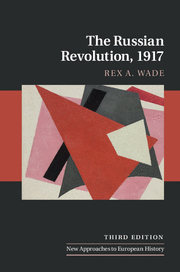Rex A. Wade
Education: B.A., Southwestern College; M.A., University of Nebraska; Ph.D., University of Nebraska
Rex A. Wade is a retired University Professor of History at George Mason University.
When did you first develop an interest in Slavic, East European and Eurasian Studies?
In fall 1958 when, in my first semester of graduate school I took a seminar on the Russian Revolution, I was hooked. It became the focus of my M.A. and then the subject of my doctoral dissertation. That was during the height of the Cold War, and there was in fact very little quality scholarship in English on the Russian Revolution. Indeed, I was fortunate to be in the group of important scholarly publications on the revolution that appeared in the second half of the 1960s, what turned out to be the beginning of a decades long big wave of publications that reshaped our understanding of the revolution.
How have your interests changed since then?
My interests have changed little. I periodically published on other topics ranging from Orthodox icons to the civil war to contemporary affairs, but the revolution always remained my main focus and the topic of most publications.
What is your current research/work project?
In recent years I have turned turned from writing additional monograph type books to doing a comprehensive study of the 1917 revolution. My book The Russian Revolution, 1917, from Cambridge University Press, is the result. However, I recently have also taken a renewed interest in the United States and the Russian Revolution. The first result is a new edition of Edward Albert Ross’s 1918 account of his travel across Russian in the last half of 1917, Russia in Transition (now in press). This year I’m committed to a variety of articles and talks on the revolution. After those, I’ll see what to do next.
What do you value about your ASEEES membership?
ASEEES and its predecessor AAASS have always been a central part of my professional life. It is where I not only get to hear new research, but meet with colleagues from around the country (and globe, now). I attended its earliest annual meetings and even through my eighteen years at the University of Hawaii I made the trek to its meetings. I’ve served as program committee chair three times, a record I think, and on other committees. I’m also deeply committed to and active in the regional associations, the Southern Conference on Slavic Studies especially.
Besides your professional work, what other interests and/or hobbies do you enjoy?
Tennis long was my favorite hobby, and I hope to resume it after I find time to get both knees replaced! My wife and I love to go to art galleries and museums, especially those showing twentieth century abstract art (and especially if they have some of the Russians from the 1910s and 1920s). Increasingly, however, the center of my attention is found in my grandchildren (one of whom is headed to Armenia in the Peace Corps), and as of this year in my two lovely great-granddaughters.
